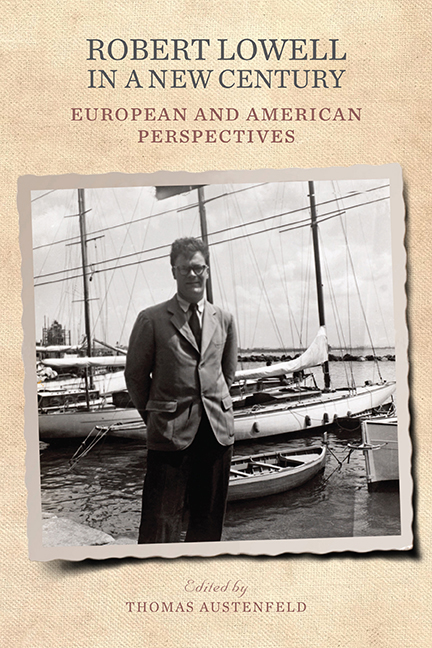Book contents
- Frontmatter
- Dedication
- Contents
- Acknowledgments
- Introduction
- 1 Revisiting Robert Lowell's Mental Hospital Poems
- 2 Sensual Drift and Ethnic Longing in Robert Lowell
- 3 Reworking the Same Water: Robert Lowell Transported
- 4 “Sweet salt embalms me”: A Hippocratic Approach to the Role of the Sea in the Poetry of Robert Lowell
- 5 More Delicate Than the Historian's Are the Map-Maker's Colors: Correspondences between Lowell's Poetics of History and Bishop's Poetics of Space
- 6 Robert Lowell and Ezra Pound's Economics
- 7 Robert Lowell and Ezra Pound in Washington and Rapallo
- 8 “Why Holland?”: Robert Lowell in Amsterdam
- 9 Lowell and Ungaretti: Imitations and Beyond
- 10 Robert Lowell's Credo
- 11 “Marriage? That's another story”: Reconsidering the Marital Trope in Robert Lowell's Poetry
- 12 “Oh No”/“Yes Yes”: Lowell and the Making of Mistakes
- 13 Robert Lowell: The Power of Influence
- Notes on Contributors
- Index
Introduction
Published online by Cambridge University Press: 26 June 2019
- Frontmatter
- Dedication
- Contents
- Acknowledgments
- Introduction
- 1 Revisiting Robert Lowell's Mental Hospital Poems
- 2 Sensual Drift and Ethnic Longing in Robert Lowell
- 3 Reworking the Same Water: Robert Lowell Transported
- 4 “Sweet salt embalms me”: A Hippocratic Approach to the Role of the Sea in the Poetry of Robert Lowell
- 5 More Delicate Than the Historian's Are the Map-Maker's Colors: Correspondences between Lowell's Poetics of History and Bishop's Poetics of Space
- 6 Robert Lowell and Ezra Pound's Economics
- 7 Robert Lowell and Ezra Pound in Washington and Rapallo
- 8 “Why Holland?”: Robert Lowell in Amsterdam
- 9 Lowell and Ungaretti: Imitations and Beyond
- 10 Robert Lowell's Credo
- 11 “Marriage? That's another story”: Reconsidering the Marital Trope in Robert Lowell's Poetry
- 12 “Oh No”/“Yes Yes”: Lowell and the Making of Mistakes
- 13 Robert Lowell: The Power of Influence
- Notes on Contributors
- Index
Summary
CENTURY MARKERS PREDICATED UPON the births and deaths of writers have a certain arbitrary quality. Why should 2017, the centenary year of Robert Lowell's birth, be particularly significant? Yet what may seem arbitrary does, in fact, have a solid anchoring in political and literary history. The year 2017 saw not just a host of events memorializing World War I and the epochal significance of America's entry onto the world stage in that war in 1917, coincident with the Russian Revolution, but it also saw a number of literary gatherings that reassessed the significance of Robert Lowell, a poet arguably more closely connected with the political history of his time and the history of his country than any other American poet in the twentieth century. Two of the highest-profile gatherings of scholars occurred in March, in Dublin, Ireland, and in April, in Fribourg, Switzerland. In the essays presented in this volume, developed from the contributions to the Fribourg conference, Lowell emerges as a poet of international resonance and significance. More important, Lowell's work proves amenable to new forms of critical appreciation, which in turn produce fresh insights ranging from considerations of his biography—his marriages, travels, mental health—to his intellectual nimbleness in conversation with his contemporaries—Ezra Pound, Elizabeth Bishop, Giuseppe Ungaretti—and to his place in the history he so assiduously gathered in volumes of poems, the thickest of which is itself called History. This volume demonstrates how Lowell's mind engaged with Europe and its poetic and intellectual traditions in active, not just receptive, ways, and it takes its readers to places and mental spaces—Holland, steamship travel, hospitals, desires, and border-crossings—that have not been previously highlighted in the same manner. The poet who published Imitations in 1961, a book often forgotten when Lowell's works are listed, never ceased to be in conversation with Europe and with history.
Starting in 1955, Robert Lowell was engaged in drafting parts of his autobiography and writing decidedly autobiographical poems. “These are the tranquillized Fifties, / and I am forty,” the poet-speaker ruminates in “Memories of West Street and Lepke,” inviting the reader to place the poem's genesis in 1957, forty years after Lowell's birth.
- Type
- Chapter
- Information
- Robert Lowell in a New CenturyEuropean and American Perspectives, pp. 1 - 13Publisher: Boydell & BrewerPrint publication year: 2019

